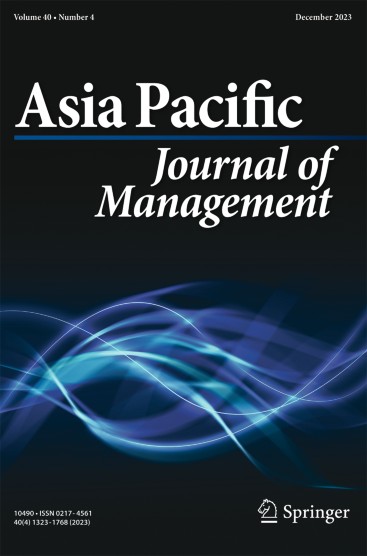兄弟姐妹竞争的后果:董事会主席的出生顺序与公司不当行为
IF 5.8
2区 管理学
Q1 MANAGEMENT
引用次数: 0
摘要
在本研究中,我们通过探讨高管出生顺序如何对公司行为产生不利影响来检验其严重的不良后果。根据兄弟姐妹竞争理论,我们假设董事会主席的出生顺序与公司不当行为呈正相关,因此,由晚出生的主席领导的公司比由早出生的主席领导的公司有更高的不当行为可能性。当董事会主席是女性时,这种联系较弱,但当家庭社会经济地位较低时,这种联系较强。我们以2003年至2020年的中国上市家族企业为样本,发现我们的预测得到了支持。我们的研究结果通过阐述出生顺序如何解释高管的不当行为,提供了新的见解。本文章由计算机程序翻译,如有差异,请以英文原文为准。
The consequences of sibling rivalry: Board chair birth order and corporate misconduct
In this study, we examine the severe adverse consequences of the top executives’ birth order by exploring how it can adversely influence their firms’ behavior. Drawing on sibling rivalry theory, we posit that board chair birth order is positively related to corporate misconduct, such that firms headed by laterborn chairs have a higher likelihood of misconduct than those headed by earlyborn chairs. This association is weaker when the board chair is a female but stronger when family socioeconomic status is low. We find support for our predictions using a sample of Chinese listed family firms from 2003 to 2020. Our findings provide new insights by elaborating how birth order explains top executives’ misbehavior.
求助全文
通过发布文献求助,成功后即可免费获取论文全文。
去求助
来源期刊

Asia Pacific Journal of Management
MANAGEMENT-
CiteScore
9.70
自引率
9.30%
发文量
56
期刊介绍:
The Asia Pacific Journal of Management publishes original manuscripts on management and organizational research in the Asia Pacific region, encompassing Pacific Rim countries and mainland Asia. APJM focuses on the extent to which each manuscript addresses matters that pertain to the most fundamental question: “What determines organization success?” The major academic disciplines that we cover include entrepreneurship, human resource management, international business, organizational behavior, and strategic management. However, manuscripts that belong to other well-established disciplines such as accounting, economics, finance, marketing, and operations generally do not fall into the scope of APJM. We endeavor to be the major vehicle for exchange of ideas and research among management scholars within or interested in the broadly defined Asia Pacific region.Key features include:
Rigor - maintained through strict review processes, high quality global reviewers, and Editorial Advisory and Review Boards comprising prominent researchers from many countries.
Relevance - maintained by its focus on key management and organizational trends in the region.
Uniqueness - being the first and most prominent management journal published in and about the fastest growing region in the world.
Official affiliation - Asia Academy of ManagementFor more information, visit the AAOM website:www.baf.cuhk.edu.hk/asia-aom/ Officially cited as: Asia Pac J Manag
 求助内容:
求助内容: 应助结果提醒方式:
应助结果提醒方式:


